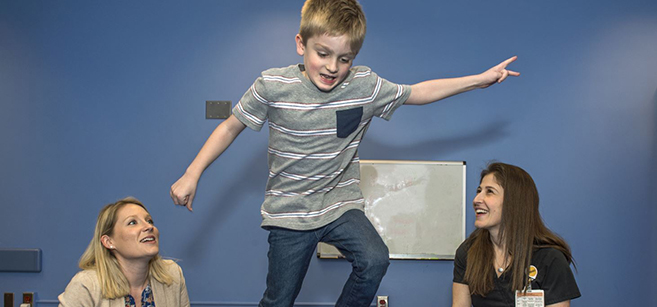Sensory/social skills: birth to 2 years
Sensory and social skills: Birth to 2 years
What are sensory and social skills?
Sensory development relates to our senses (vision, hearing, touch, taste, smell) which allow us to explore the world around us.
Social skills refer to our interactions with other people. (For an infant or child, social skills generally center on behavior in play situations.)
Why are social skills and sensory skills important?
Social skills help children have positive interactions with each other to make and keep friendships.
Social interactions at this age begin with how the infant or child relates to the parent or caregiver. Early social skills include vocalizing in response to an adult talking and smiling or responding playfully to seeing his or herself in a mirror. These skills progress to cooperating with simple games or sing along songs, offering hugs and kisses, and imitating adult behavior.
Children use their senses to explore and try to make sense of the world around them. They do this by touching, tasting, smelling, seeing, moving and hearing. Sensory play helps language development, cognitive growth, fine motor skills and gross motor skills, problem solving skills and social interactions.
Is my child showing normal sensory or social skill development based on their age?
3-6 months
- Cuddles and relaxes when held
- Responds with baby sounds when caregivers talk and smile
- Able to be calmed by a caregiver when upset
5-7 months
- Knows their own name and responds by looking when called
7-12 months
- Has toy preferences and explores a variety of toys
12-18 months
- Likes attention from others and will do behaviors to get reactions
15 months
- Shows liking for affection and will hug/kiss familiar people
18 months
- Plays with other children; seeks interactions with other children
How to help skill development: Sensory and skill activities to help your baby
You can help your child develop sensory skills by:
Positioning... Senses of vision, hearing, touch, taste and smell are all developing in a young infant. We also have a "positional sense"; this helps us to define if our body is moving, and where we are in space (sitting up or lying on our stomach). This positional sense is why babies like to be rocked. To help them have an enriched environment, alternate rocking with swaying, try different rocking chairs and change the baby's position - swaddled in a blanket, upright on your shoulder, or lying on his/her stomach across your lap. Go for walks with your baby in a snuggle pack or backpack for stimulation.
Massaging... For the development of touch sense or tactile awareness, provide your infant with massage to arms, legs and trunks. You can use baby lotion or oils if you like. CHoR offers great classes for infant massage. This activity is great for bonding time with your child.
You can help your child develop social skills by:
Engaging…Sing simple songs (for instance, Wheels on the Bus) that offer opportunities for a child to imitate your hand motions or gestures. Use a mirror to make silly faces in. Toss or roll a small ball back and forth, play peek-a-boo with a burp cloth, and offer lot of hugs and kisses.
What if I am concerned about my child's sensory and social skill development?
If you have concerns regarding your child's development or your child is regularly missing development milestones, occupational therapists can assess development and address concerns. If you are concerned about your child's development of sensory motor skills or social skills, a physician or therapist may be able to assist with an evaluation.
Our occupational therapists help address problems related to cognitive, daily living, motor, sensory processing, social and visual/perceptual skill development.
To make an appointment with a pediatric therapist, call one of these locations:
- Bon Air Therapy Center 804-323-9060
- Brook Road Campus 804-228-5818
- Fredericksburg Therapy Center 540-891-4485
- Glen Allen Therapy Center 804-273-6656
- Petersburg Therapy Center 804-733-7233
- Stafford Therapy Center 540- 659-7337
Information provided by Sallie Tidman, OT/L, Director of Therapy Services, Melanie Koch, Occupational Therapist, and Sarah Phillips, Occupational Therapist.

